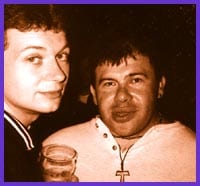Immigration Canada claims that William Granados is pretending to be queer just so he can stay in Toronto.
A note from the immigration panel that heard the case states that his “homosexuality is a fabrication, intended to save his refugee claim.”
So Granados was refused refugee status and deported back to Venezuela Jun 17 – while a second case on humanitarian and compassionate grounds was still pending.
But Granados and his friends in Toronto’s latino gay community say that, as opposed to Canadian officials, Venezuelan bashers and police have no trouble believing that Granados is gay. They claim that since he was deported, Granados has been beaten three times by police, harassed by neighbours, forced to leave a job and now lives in hiding on Margarita Island.
“If William tells anyone, ‘This happened to me because I’m gay,’ the police, the doctors, even his family will have him beaten,” says Ricardo Rodriguez, a former Miss Hola, Chabouka la Grande and Granados’s friend and supporter. “He could end up being dead.”
Immigration Canada did not believe Granados because the would-be refugee didn’t disclose his orientation until midway through a hearing – and because he displayed discomfort, confusion and anxiety while talking about his homosexuality.
“Talking about being gay is not a part of our culture,” says Rodriguez. “Immigration Canada is failing to recognize cultural differences.
“Taking William to the airport was like burying my friend alive.”
Rodriguez calls his friend “a man who made a real difference in his community.”
In addition to the latino gay group Hola, Granados volunteered with the AIDS Committee Of Toronto and the Coalition Against Homophobia. Despite these activities, the refugee board’s notice refers to Granados as “uncomfortable” with other gay men.
In a last ditch attempt to convince the panel of Granados’s orientation, his previous lawyer had him submit to an anal exam. “A measure even the medical examiner knew was ridiculous,” says his current lawyer, El Farouk Khaki.
One of the problems with documenting Granados’s persecution as a gay man in Venezuela is that he has been disowned by his family and is totally isolated. Official sources offer even less protection. “Bribes, physical, sexual and psychological abuse are all common police tactics,” says Khaki.
Granados does have medical problems – a spinal injury that he alleges was caused by a kick from a police officer. This disability could be exacerbated by further physical attacks and a lack of medical attention.
Granados’s story and that of other Latin Americans is told in a documentary by Anton Wagner, Latin Queens: Unfinished Stories Of Our Lives. The video will premiere on Fri, Nov 19 at the 519 Church Street Community Centre by the Proactive Intervention Response Group, which has been formed to help bring Granados back to Canada and to raise awareness about the treatment of gay, lesbian and transgendered people around the world.
“Dogs are treated better in Venezuela than the transgendered are,” claims another Venezuelan, Maury Mariana, in the video. Mariana was able to immigrate, but fears for those left behind. “Almost all of my generation are dead. They had no protection of any kind.”
Granados’s new case should be reviewed early in the new year. In the meantime, his friends are working overtime. After the screening of Wagner’s documentary, the meeting will launch a postcard and letter-writing campaign to the Ministry Of Citizenship And Immigration Canada. On Sat, Nov 20 at the Red Spot (459 Church St), an evening fundraiser will help cover the costs of the case.
Khaki says that he has won five previous claims from Venezuelans on similar grounds.
Latin Queens: Unfinished Stories Of Our Lives.
Free. 6pm. Fri, Nov 19.
519 Church Street Community Centre.
(416) 515-0425.

 Why you can trust Xtra
Why you can trust Xtra


